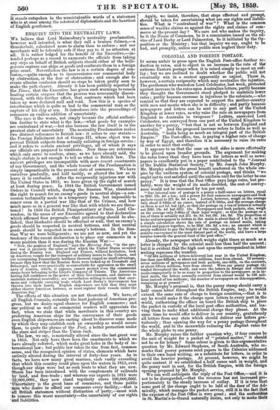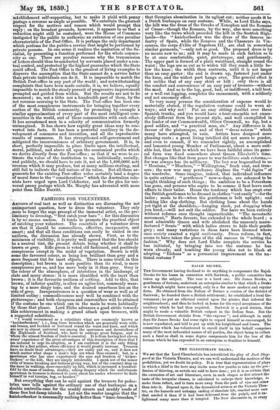COLONIAL AND FOREIGN POSTAGE.
IT seems unfair to press upon the English Post-office further re- duction in rates, and to object to an increase in the rate of the extreme Eastern postage when it is raised simply to meet an out- lay ; but we are inclined to doubt whether the public will not eventually win in a contest apparently so unjust. There is, however, a certain reciprocity which may neutralize the injustice. The gentlemen who waited on Lord Colchester, last week, protested against increase in the rates upon Australian letters, partly because they thought the Government stood pledged to maintain lower rates ; partly because encrease is injurious to the colonists,—who remind us that they are expected to support the mother-country with men and means when she is in difficulty ; and partly because newspapers and letters can be sent to any part of the United Kingdom at lower rates, so why raise the rate on newspapers from England to Australia to twopence ? Letters, answered Lord Colchester, are conveyed from one part of the United Kingdom to another for a penny, but that is not so between England and Australia." And the proposed increase refers to India as well as Australia, "India being as much an integral part of the British Empire." The Post-office, too, is paying a higher rate of charge
i by way of Egypt, and therefore it s necessary to raise its rates in order to meet that outlay.
It appears to us that the ease on both sides is more effectually to be placed upon broader grounds. The argument for making the rates lower than they have been for letters as well as news- papers is excellently put in a paper contributed to the "Journal of the Dublin Statistical Society, by Mr. Joseph John Murphy. Mr. Murphy admits the great benefit conferred on the whole em- pire by the uniform system, -of colonial postage, and thinks "we ought not to rest satisfied until the uniform unit for the letter be one penny." It is true that the Post Office pays large rates but pro- bably, were the weight of its mails doubled, the cost Of convey- ance would not be increased by ten per cent. "Our internal rate of postage is a penny a half-ounce on letters, equal to 298/. 13s. 4d. a ton ; and a penny for four ounces on newspapers and book packets equal to 371. 68. 8d. a ton. Letters, however, weigh on the average only about 6-16ths of an ounce, instead of 8-16ths, and the average charge on them is not ld. but lid., so that the postage on a ton of letters in actually not 298/. 13s. 4d. but 5371. 128. Newspapers and book packets, also, weigh on the average only 5-8ths of their legal weight : so that the postage on a ton of them is actually not 371. 6s. 8d. but 591. 14s. 8d. The proportion of books and newspapers to letters in the mails is about that of 1 to 6; so that a simple calculation shows the rate of postage on inland mails, taking letters and papers together, to be 264/. 108. 8d. a ton ; an amount which is amply sufficient to pay the freight of the mails, as goods, by the most ex- pensive conveyance to the most distant part of the world, and leave a large surplus towards the general fund of the post office."
Already, the newspaper which weighs eight times as much as a letter is charged by the colonial mail less than half the amount ; but it is evident that the high cost upon the correspondent in letter ,writing represses the number.
"Of 604 millions of letters delivered last year in the United Kingdom, less than one-fiftieth, or about ten millions, were from abroad. Of seventy- seven millions of newspapers and book packets, one-fifth, on the contrary, or about fifteen millions, were from abroad. 'Were our penny postage ex- tended throughout the world, and were the letters in foreign and colonial mails consequently to be as many in proportion to the newspapers as in in- land mails, the letters annually received from abroad would be 100 mil- lions instead of ten millions ; the number of newspapers on this supposition, remaining as at present." Mr. Murphy's proposal is, that the penny stamp should carry a half ounce letter throughout the British Empire, nay, he would extend the same rate of charge to foreign countries,—that is to say he would make it the charge upon letters to every port in the world, authorizing the officer on board the British ship to place the packet in custody of the local post office authorities, and lea- ving them to make what additional charge they please. At the same time he would offer to deliver in our country, gratuitously all letters from any state which should deliver our letters gra- tuitously; thus opening the way for a penny postage throughout the world, and in the meanwhile reducing the English rates for the whole globe to one penny. Mr. Murphy raises the further question why, if four ounces be the unit of weight for a packet of "printed matter," it should not be so for letters ? Some colour is given tothisarumentatiye question by Mr. Edward Stephens, of South Australia, who re- marks that poorer persons send. papers to the Colonies addressed in their own hand writing, as a substitute for letters, in order to avoid the heavier postage. At present, however, we might be quite content if we established a half ounce unit in weight, and the penny unit in cost, for the British Empire, with the foreign opening proposed by Mr. Murphy. We can well anticipate the reply of the Post Office,—and it is not to be disregarded,—that the revenue has not increased pro- portionately to the steady increase of outlay. If it is true that some part of the charge ought to be laid at the door of the Ad- miralty, which manages the packet service, still it is the fact that the expense of the Post Office is very great ; and the authorities in St. Martin's-le-Grand naturally desire, not only to make their
• establishment self-supporting, but to make it yield with penny postage a revenue as ample as possible. We entertain the greatest respect for the motives and reason which would prompt this reply ; on the broadest grounds, however, it appears to us that a reduction might still be sustained, were the Rouse of Commons • instigated by the public to authorize an extension of one peculiar
• characteristic of the Post Office. It is perhaps the only department which perfoms for the public a service that might be performed by private persons. In one sense it realizes the aspiration of the So- cialist, by presenting a function performed for the whole commu- nity as one. There are peculiar reasons why the transmission of letters should thus be conducted by servants placed under a cen- tral control, and protected la the highest guarantee which the State could afford. The Post Office is the greatest of living examples to disprove the assumption that the State cannot do a service better than private individuals can do it. It is impossible to match the British Post-office in any part of the world ; and notwithstanding complaints that have been made outside, it is, we believe, equally impossible to match the steady pursuit of progressive improvement prompted and guided from within. But the results are not to be measured; no, not a tithe nor a hundredth part of them by the net revenue accruing to the State. The Post-office has been one of the most conspicuous instruments for bringing together every section of the British community, for promoting by example a similar approximation of every part of the most intelligent com- munities in the world, and of those communities with each other. It has accustomed men to a celerity of communication formerly ' unimagined. It has shown how rapidly great ideas may be con- verted into facts. It has been a powerful auxiliary in the de- velopment of commerce and invention and all the reproductive
• results of commerce. It has strengthened self-government and • mitigated the inconveniences of arbitrary government. It is in short, perfectly impossible to place limits upon the intellectual, moral, political, and above all upon the economical profits which . we derive directly from the Post-office ; so that if we were to es- timate the value of the institution to us, individually, socially,
• and publicly, we should have to rate it, not at the 1,400,0001. nett -revenue which it may produce, but at many millions sterling, and still fail to indicate the full nature of its value. But all these ar- guments for the existing Post-office rules certainly lend a degree of moral force to the "considerations" which the Australian colo- nists have urged upon Lord Colchester, and to the plea for uni- versal penny postage which Mr. Murphy has advocated with more point than Ehhu Burritt.



























 Previous page
Previous page